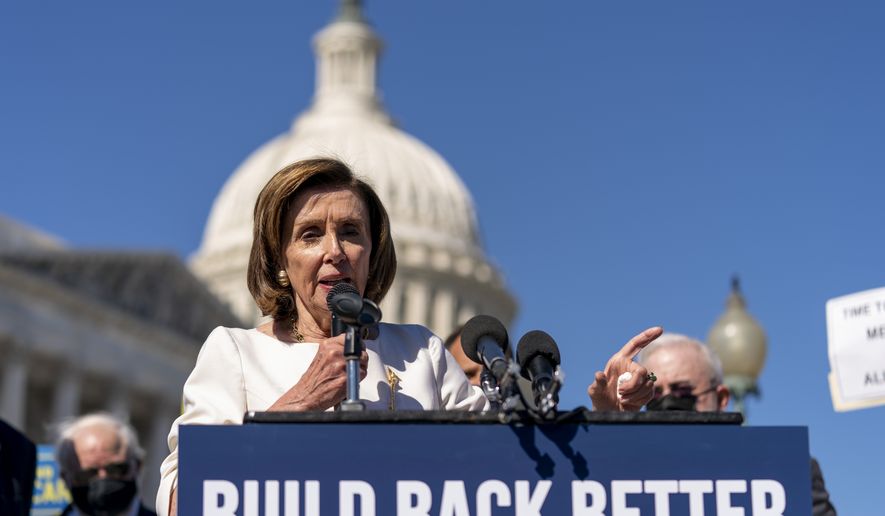The Democratic Party’s warring political factions on Wednesday moved incrementally closer to a final agreement on President Biden’s massive party line spending bill.
House Speaker Nancy Pelosi argued that progress was being made in putting together a bill that would be in line with Mr. Biden’s domestic priorities and acceptable to all Democrats. Mrs. Pelosi, a California Democrat, said that a potential deal on the package’s framework could be finalized this week.
“It’s very possible, we’ve been on schedule for every deadline,” Mrs. Pelosi said. “We have a goal, we have milestones … and we will be where we need to be in order to reach our goal.”
The optimism comes after Mr. Biden met privately at the White House with two different factions of his party: moderate and far-left Democrats. In a broad discussion with both groups, Mr. Biden reportedly stressed the need for compromise and unity.
“I call him the ’mediator in chief,’” said Rep. Jimmy Gomez, a California Democrat who attended one of the White House meetings on Tuesday. “It’s going to be touch-and-go. But … the president is committed [to] trying to get this done as soon as possible.”
After months of back and forth, Mr. Biden’s intercession appears to have buoyed the negotiations.
Originally, the White House wanted the spending bill to run upwards of $3.5 trillion and have it include long-sought liberal priorities, like free community college, amnesty for illegal immigrants and expanded health care programs.
Centrist Democrats, including Sens. Joe Manchin III of West Virginia and Kyrsten Sinema of Arizona, balked at such ambitions. Instead, they urged Mr. Biden to temper the size and scope of the spending package.
Despite the moderates being few in numbers, their influence appears to be winning out. That’s because Democrats plan to use a special procedure, known as budget reconciliation, to move the legislation through the evenly split Senate along party lines.
“As we’ve been saying now for months, we shouldn’t vote on anything [in the House] that can’t get out of the Senate,” said Rep. Josh Gottheimer, a New Jersey Democrat and leading moderate.
The political reality of governing with an evenly divided Senate has forced Mr. Biden to scale back his proposal from $3.5 trillion to roughly $2 trillion. Some Democrats even estimate the actual figure for the bill is likely to be between $1.75 and $1.95 trillion.
To reach the figure, Mr. Biden has sidelined several top priorities from the bill.
Already out, according to sources, is the $108 billion that Democrats earmarked to pay for at least two free years of community college for all students, regardless of citizenship status.
“That was not one of our five priorities, but I just kept pushing it every time, every chance I could because I really believed in it,” said Rep. Pramila Jayapal, a Washington Democrat who chairs the Congressional Progressive Caucus. “But it doesn’t look like that will be in there.”
Also on the chopping block is making the child tax credit permanent. Mr. Biden expanded the credit earlier this year, giving parents with children under the age of 6 $3,600 in direct payments annually. The expansion was only supposed to be temporary to help deal with the fallout of the COVID-19.
Most Democrats have called for the expansion making the program permanent, despite fiscal watchdogs estimating it would cost upwards of $1.6 trillion over the next decade.
Earlier this month, Mr. Manchin told the White House he wanted to means-test the program and add work requirements for recipients. The opposition forced Mr. Biden to concede ground.
Instead of making the expansion permanent, Democrats are now poised to only extend it for another year. There is also talk of preventing families making upwards of $60,000 annually from being eligible.
To further save costs and placate moderates, Mr. Biden is considering scaling down his paid family leave plan. Initially, the White House proposed spending $225 billion to provide 12 weeks of paid family and medical leave to employees.
Now, Mr. Biden has told lawmakers the plan is likely only to offer four weeks of leave with only individuals making less than $100,000 eligible.
Similarly, means-testing is likely to apply to the administration’s proposal for child care subsidies. Mr. Biden has told lawmakers, however, that his original plan to spend $450 billion to fund a universal pre-kindergarten program for children ages 3 and 4 is likely to remain unchanged.
Neither progressive nor moderates have endorsed the compromises Mr. Biden has floated. Strong divisions also remain over climate change and expanding Medicare to cover vision, dental and hearing coverage.
• Haris Alic can be reached at halic@washingtontimes.com.




Please read our comment policy before commenting.